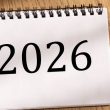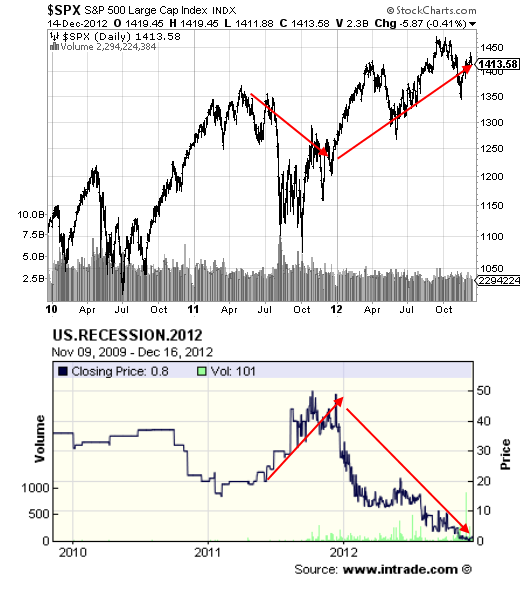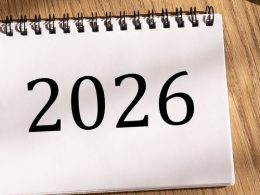by Cullen Roche, Pragmatic Capitalism
The stock market has really thrown everyone for a loop again this year. An article in the NY Times this weekend highlighted the fact that the global economy is very weak while stocks remain relatively strong. Unfortunately, the article’s conclusion distorts our reality in another classic case of recency bias by comparing the current stock performance to the current calendar year. The article states:
“When you buy stocks, you are ultimately buying a share in corporate profits, which are influenced by the overall economy. Nonetheless, the amount of growth in a country’s gross domestic product shouldn’t be confused with the prospects for its stock market, says Simon Hallett, chief investment officer at the asset management firm Harding Loevner. “I cannot emphasize that enough,” he says.
Investors need only look to the current year as an example. The domestic economy has grown at an annual pace only slightly above 2 percent, subpar by historical standards. Overseas, the picture is worse: Japan is teetering on the brink of yet another recession, large parts of Europe’s economy are contracting and China’s pace of growth has slowed uncomfortably.
Yet against this bleak backdrop, United States stocks have returned 15 percent, on average, this year, while those in Europe have gained 18 percent and Asian stocks are up more than 12 percent.”
If viewed in the narrow scope of 2012 this seems to make a lot of sense. Stocks surely don’t seem to have any correlation to the economy. But this sort of thinking totally misunderstands the way prices fluctuate and how investors try to price in various movements.
Now, I agree with the general premise that the stock market is not the economy. There is never a 1:1 relationship and the variables involved in the economy do not always perfectly translate into stock market prices. But we know from works such as the Kalecki profit equation that there is at least a moderately strong relationship between economic activity, profits and future stock market prices. The problem is that the irrational participants in any market do not always properly anticipate how these macro variables will filter through to the micro.
For instance, take the last couple of years. In early 2011 the economy seemed to have gained some relatively solid footing. Corporate profits were moving higher and recession fears were relatively low. We had just come off a recession scare in 2010 when it was widely believed that the Euro crisis could throw us back into the meat grinder. It didn’t happen and when it failed to materialize the stock market correctly accounted for the summer declines that had anticipated far reaching negative effects from Europe. 2011 was very similar. The year starts off with a nice rally of 7% as the economy appears to have thwarted recession and then the summer rolls around and look what happens:
Everything starts out generally positive and then in the middle of 2011 recession odds surged from a 20% chance to 50%. And the market melted just as it had the year before. Remember, the market is not an efficient pricing mechanism that accurately prices in recession or even most things. The participants in these markets suffer from the worst case of “shoot first, ask questions later” you’ve ever seen in your life. Only someone with zero real trading experience could theorize that markets are efficient. I’ll tell you from a decade of experience trading event driven strategies that that’s the biggest load of nonsense you’ll ever read. I’ve logged thousands of hours in the trenches watching how terribly inefficient these markets are and how quick human beings are to pull the trigger on something they don’t understand or are totally ill-equipped to psychologically adapt to. I’ve been on the wrong end of many of those decisions.
Anyhow, the current disconnect is actually a relatively unsurprising result. My research has shown that the worst rolling 12 month declines in the stock market almost always occur in recession (see here for more). Investors don’t obsess over declines in output for no good reason. So it’s not surprising that the stock market begins to panic a little bit when there is evidence of recession. But you have to keep things in perspective and understand the dynamics of pricing.
Back to our example – the January 1, 2012 stock market was priced at exactly the same price as January 1, 2011. That’s despite 15% growth in operating earnings in 2011 and 9% revenue growth. On January 1, 2012 the stock market was also beginning to price in a strong probability of a recession. And then what happened? The economy started to surprise to the upside. In the first quarter of this year the odds of recession plummeted as economic prospects improved and fears over Europe proved overdone (once again). And as the year continued the economy continued to surprise to the upside and profits, while weakening, were certainly not wilting. In other words, the stock market in 2012 was just making up lost ground because its irrational participants had incorrectly priced in the odds of recession in 2011.
The stock market might not be the economy, but that’s mainly because its irrational participants generally fail to anticipate how the two actually impact one another.
Copyright © Pragmatic Capitalism














